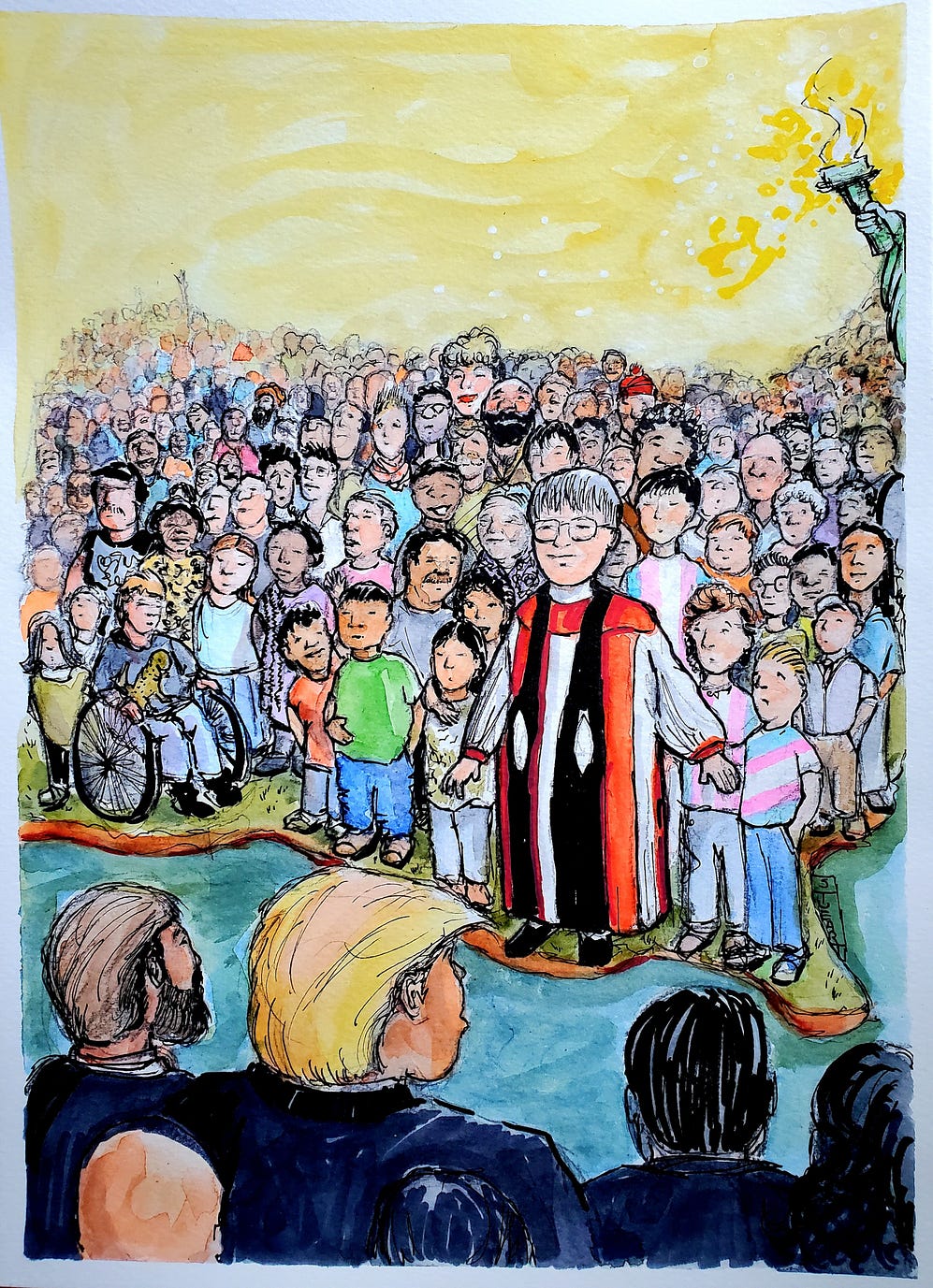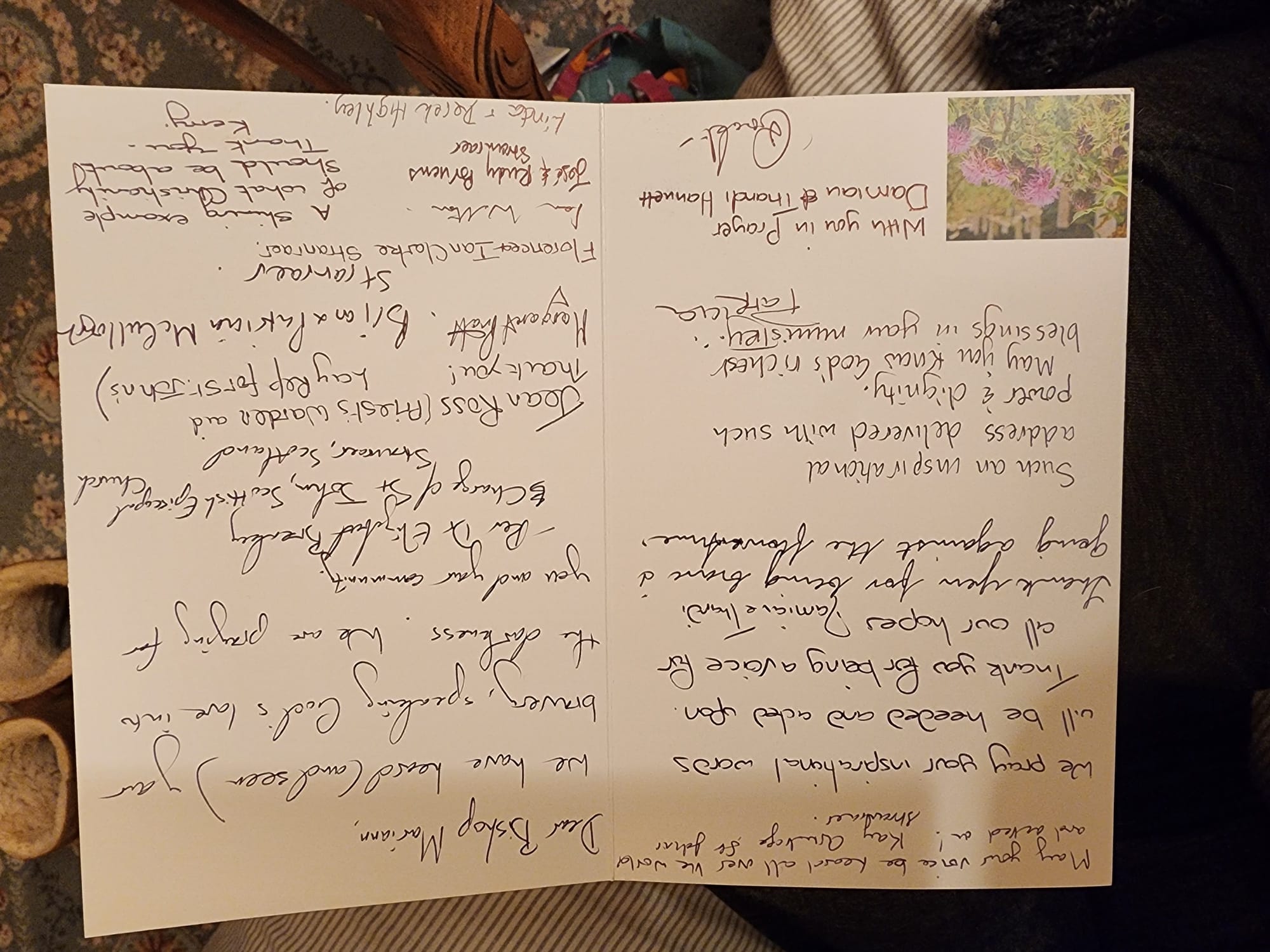‘Christianity 101’ being preached by unlikely sources
Thursday, 20 February 2025
| Lesa Scholl

On 21 January 2025, Bishop of Washington Mariann Budde did something remarkable: her job.
Bishop Budde’s sermon at the National Prayer Service marking the inauguration of the American President should have been run-of-the-mill. She has given many sermons throughout her long career, in the same vein of integrity, mercy and compassion.
Except it’s not really run-of-the-mill when your job gives you an opportunity to speak God’s word directly to the person who has just been sworn in as president.
In a lot of churches, the sermon Bishop Budde gave would not have raised an eyebrow. It is true that some churches have more traditional views on gender, which would mean no female bishops. But the message of God’s love for all, and especially compassion for vulnerable people such as refugees, shouldn’t be questionable.
The sermon delivered at the service in January was not run-of-the-mill, however, because of who was in the congregation.
Bishop Budde could have chosen to speak in such a way that didn’t bring the conviction of God’s word. She could have said words that made the new administration feel warm and fuzzy inside. Instead, she chose the work of the prophet. Speaking with astounding humility and grace, her words cut swiftly to the heart. Why else would the knee-jerk response of ‘nasty’ be flung back in her direction?
Bishop Budde’s brave decision to speak truth to power has done something astonishing. To a degree, it doesn’t matter what the president’s response was. The bishop’s willingness to take an opportunity to use her God- and church-given authority to speak for the vulnerable and fearful has opened up conversations about the Gospel across the world.
I work as a journalist for a church newspaper and I’m also in the Year of Discernment to consider ordained ministry, so I was particularly inspired by Bishop Budde’s power of communication and call. But what encouraged me even more was what happened after she spoke. Not the administration’s angry railing, but the seeping of the Gospel into all manner of channels and tributaries.
In recent decades, the Church has lost its presence in western society. It isn’t seen as relevant and, in Australia at least, the Royal Commission into Institutional Responses to Child Sexual Abuse has had a lasting impact on the moral authority of the Church to speak on public matters.
But after Bishop Budde’s sermon, I started to see people I’d considered entirely distanced from the Church sharing memes and posts on social media, not just in support of the bishop, but quoting clergy from different denominations who were speaking out the same truths of mercy and grace: the Good News of Christ.

Image: Support sent to Bishop Budde from St John’s Scottish Episcopal Church in Stranraer, Scotland. Picture: Reverend Elizabeth Breakey
All of a sudden I was seeing the Gospel all over my social media feeds. Of course, I know how the algorithms work to create echo chambers; but I have, shall we say, a very broad range of friends. And they were, in effect, sharing the Gospel of Christ. They were calling for mercy and justice, evoking the same Sermon on the Mount from which Bishop Budde had preached.
The full transcript of Bishop Budde’s sermon has appeared in secular publications across the globe. Why is this extraordinary? One of my journalism mentors has told me that, 25 years ago, newspapers would have journalists go to major churches on a Sunday and a summary of the sermons would be published in the next day’s paper. This idea was foreign to me in the 21st century. And yet now we have a sermon flooding the digital ether.
In Australia, Julia Baird wrote about it for the Sydney Morning Herald. She wrote that Bishop Budde’s sermon was ‘pretty much Christianity 101, woven directly from Bible verses’. A regional paper in Salt Lake City wrote about how a bishop went viral. Indeed, Bishop Budde went viral, but so did the Gospel. People are talking about the Word of God all over the world. It seems that suddenly the Church has been given back at least some of its relevance.
Bishop Budde has not only opened up the public space for the Church again; she has brought deep encouragement, unity and prayer to Christian communities across the globe. While some church communities and voices have spoken in opposition to Bishop Budde’s sermon, there is no question that she has empowered many people to speak on behalf of the Gospel. I recently wrote a lovely story of a Melbourne parish’s messages of encouragement sent to Bishop Budde in the wake of the publicity. President of the Uniting Church of Australia Reverend Charissa Suli wrote an open letter of support to Bishop Budde. St John’s Scottish Episcopal Church in Stranraer, Scotland, did something similar (pictured). Around the world, the church is rising up in communities and parishes, emboldened in the Word of God and in the call to encourage and lift one another in love and prayer.
Although President Trump said that the service wasn’t very interesting, it certainly seems that the world disagrees with him on this point. That the Bishop of Washington’s sermon has attracted vitriol alongside so much support shows that her words hit a multitude of nerves. With Stranraer’s St John’s parish, I pray that Bishop Budde’s voice would continue to be heard across the world, and that people everywhere would consequently be emboldened to share truth, grace and mercy in the unity of Christ.
Lesa Scholl is Coordinating Editor for Ethos and a journalist for The Melbourne Anglican.
Featured image: ‘Gulf of Empathy’. Used with permission. ©Jerome Stueart 2025 jeromestueart.com